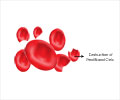Anemia or low levels of hemoglobin remains a potential adverse effect of bariatric surgery, even after a decade.

Dan Eisenberg, M.D., M.S., of the Palo Alto Veterans Affairs Health Care System, Palo Alto, and Stanford University, Stanford, Calif., and colleagues examined the prevalence of anemia 10 years after RYGB and assessed whether postoperative bariatric follow-up influences rates of anemia. The study included 74 patients (78 percent men; average age, 51 years) who underwent RYGB at a single Veterans Affairs Medical Center.
The average rate of preoperative anemia was 20 percent; the rate increased 10 years after RYGB to 47 percent. At 10 years after RYGB, the anemia rate in the group without bariatric specialist follow-up increased to 57 percent, from 22 percent before surgery.
The rate of anemia in the group with bariatric specialist follow-up did not increase significantly after 10 years (19 percent vs 13 percent). Compared with patients with bariatric specialist follow-up, patients without bariatric specialist follow-up had significantly higher odds of anemia at 10 years after adjusting for preoperative anemia.
The major limitation of this study was the size of the group with bariatric specialist follow-up, which may be too small to identify a significant difference in the 10-year anemia rates compared with preoperative rates.
"Our study suggests that follow-up with bariatric specialists more than 5 years after surgery, rather than with specialists with no bariatric expertise, can decrease long-term anemia risk. This finding may demonstrate the bariatric specialist's specific understanding of the long-term risk for nutritional deficiency after RYGB and the importance of vitamin and mineral supplementation," the authors write.
Advertisement















